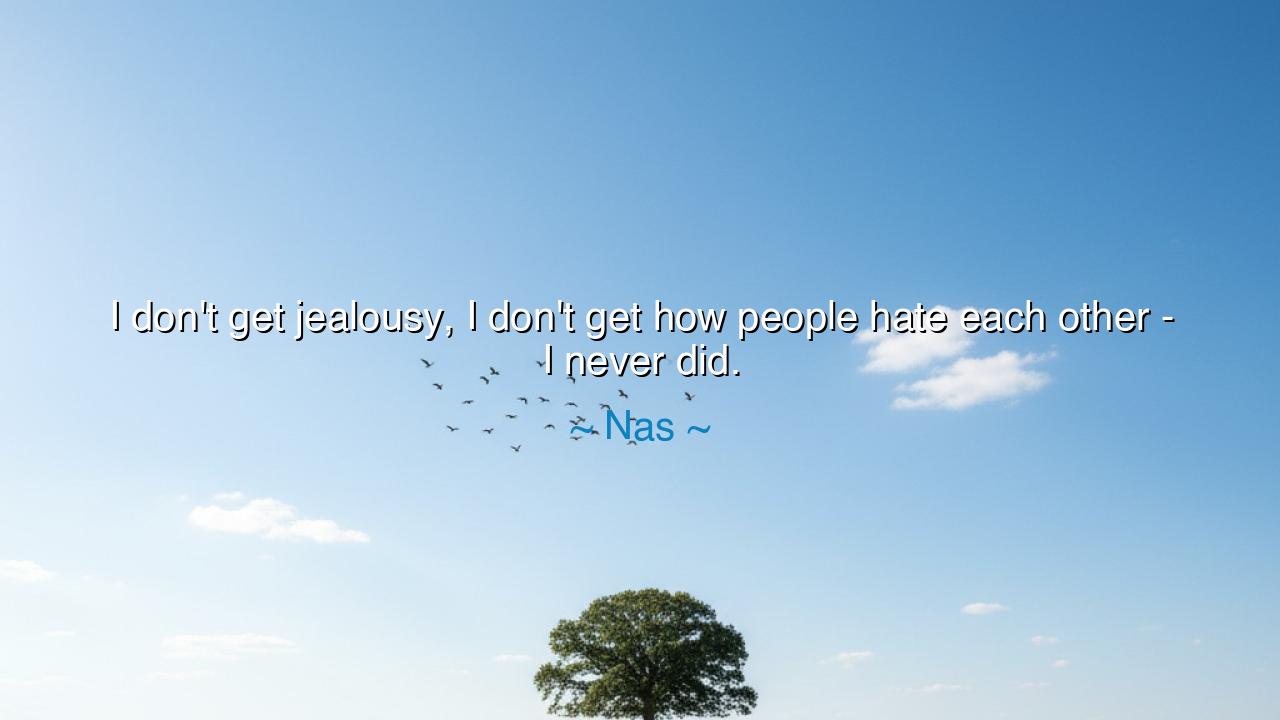
I don't get jealousy, I don't get how people hate each other - I






“I don’t get jealousy, I don’t get how people hate each other — I never did.” So spoke Nas, the poet of the streets, a voice born from struggle yet rich with wisdom. In his words lies not confusion, but purity — the wonder of a soul that has seen darkness and refused to join it. He speaks not as one blind to evil, but as one who sees through it, recognizing that jealousy and hate are the chains that bind humanity to its lowest self. To not “get” them is not ignorance — it is transcendence.
From the dawn of man, envy and hatred have been twin fires consuming the heart. Cain and Abel, sons of the same mother, are the first testament. One looked upon the other’s blessing and felt his spirit twist into rage; his love turned to bitterness, his brotherhood to murder. And so began the long tale of humankind, where one man’s light becomes another’s shadow, and one woman’s joy becomes another’s grief. Yet even then, there were those rare souls — prophets, poets, and sages — who could walk among envy and remain untouched. Nas, in his own age, joins their company. His words echo their ancient wisdom: that true strength lies not in victory over others, but in victory over oneself.
For jealousy is the disease of those who measure their worth by the reflection of another. It is the blindness that turns admiration into resentment, and opportunity into despair. Hate, its darker brother, is the poison that divides what should be whole — it is the madness of believing that one’s pain can be healed by another’s suffering. To say, as Nas does, “I never did,” is to stand apart from this madness — to choose vision over blindness, unity over division, love over the hollow satisfaction of vengeance.
Think of Nelson Mandela, who, after twenty-seven years of imprisonment, emerged without bitterness in his heart. The world expected vengeance; he offered forgiveness. The bars that held his body could not hold his spirit. He “didn’t get hate” — for he saw that hatred is a second prison, one of the mind, built by those who cannot forgive. Like Nas, Mandela looked upon a broken world and chose to heal it instead of cursing it. This is the essence of true liberation: to understand the pain of others without inheriting their anger.
There is a quiet heroism in such hearts. For it is easy to hate — easy to point fingers, to curse, to mock, to divide. But to remain uncorrupted by jealousy and hatred, to look upon the success of others and feel joy instead of spite — that is the mark of wisdom. The soul that refuses to hate has already conquered the world. It has freed itself from the tyranny of comparison, from the noise of ego, from the endless hunger for validation that devours peace.
Nas’s words remind us that love and understanding are not naïveté — they are rebellion. To choose empathy in a world of envy is to wage a quiet war for the soul of humanity. The man who does not understand hate is not blind; he is awake. He sees that life is not a contest, but a symphony — each note rising and falling in harmony, not competition. When one instrument envies another, the music is lost. When all play together, the world becomes beautiful again.
And so, my children of tomorrow, let this be your lesson: do not learn jealousy, for it teaches nothing but sorrow. Do not learn hate, for it destroys the very heart that holds it. When envy whispers, answer with gratitude; when anger burns, cool it with compassion. Celebrate others as you wish to be celebrated. If you must compete, let it be with your past self, not your neighbor. And when the world tries to teach you bitterness, respond with wonder — as Nas did — and say: “I don’t get it. I never did.”
For that simple truth, spoken by a man of his time, carries the wisdom of the ages: the heart that does not understand hate has already found peace. And that peace is the foundation upon which all true greatness is built.






AAdministratorAdministrator
Welcome, honored guests. Please leave a comment, we will respond soon